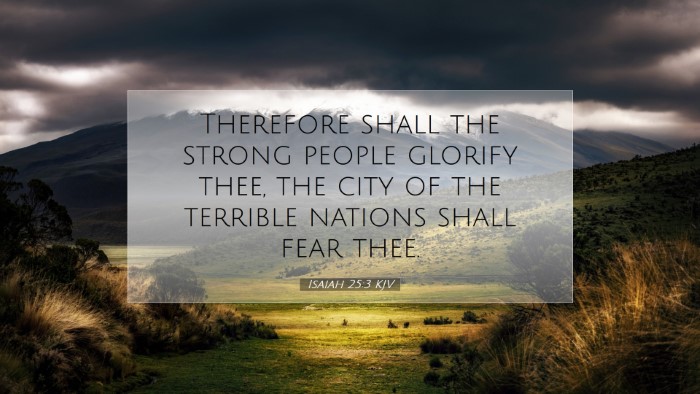Commentary on Isaiah 25:3
Verse: "Therefore shall the strong people glorify thee, the city of the terrible nations shall fear thee."
Introduction
Isaiah 25:3 serves as a powerful proclamation within the context of comfort and hope for the people of Israel. This verse draws attention to the reaction of both strong nations and formidable cities to the splendor and majesty of God’s power and presence. The resulting glorification from the strong and the fear from the powerful underscores the ultimate sovereignty of God over all creation.
Contextual Background
This verse forms part of a series of prophecies wherein Isaiah seeks to offer comfort and hope to the people of Israel during times of turmoil and oppression. Understanding the historical backdrop, including the Assyrian threat and the Babylonian exile, reveals the emotional and spiritual state of the Israelites. God's promise of eventual deliverance and restoration is a prevalent theme throughout Isaiah.
Insights from Commentaries
Matthew Henry
Matthew Henry emphasizes the extraordinary nature of God's intervention in human affairs. He notes that, despite the might of earthly powers, it is ultimately God who commands reverence and fear from the most powerful nations. When God manifests His glory, even those who consider themselves strong are compelled to acknowledge His greatness. Henry suggests that this glorifying of God will be led by a sincere acknowledgment of His sovereignty, resulting in true worship and adoration.
Albert Barnes
Albert Barnes elaborates on the relationship between God and nations in his commentary, highlighting that Isaiah is depicting the overwhelming impact of God's majesty. He explains that "strong people" refers to nations that rely on their own power and military strength. Yet, when faced with the presence of God, these nations will be moved from pride to glorification. The "city of the terrible nations" symbolizes those that have instilled fear and oppression, yet they, too, will recognize the true authority of God. Barnes points out that this transformation reflects God’s ultimate plan for the redemption of all nations.
Adam Clarke
Adam Clarke's exposition offers a deeper understanding of the significance of fear and glorification. Clarke states that the fear indicated here is not merely dread but a profound respect and acknowledgment of God’s power. The strong peoples, who once considered themselves invincible, will be brought to a place of humility and worship. Clarke discerns a prophetic message that transcends Israel, suggesting that the world's kings and rulers will eventually bow before God's authority in recognition of His divine rule. He also emphasizes that such recognition leads to a richer understanding of God’s glory in the midst of adversity.
Theological Implications
The theological implications of Isaiah 25:3 resonate deeply with themes of divine sovereignty, human humility, and the nature of worship. The recognition of God’s greatness by the strong reveals a universal truth: that no amount of human power or strength can stand against the majesty of God. This reinforces the overarching biblical narrative of redemption and restoration, where God’s plan includes all nations, moving them toward acknowledgment of His lordship.
Additionally, the fear of God as expressed here is essential for spiritual formation. It compels believers to a posture of reverent worship, acknowledging their need for God’s grace and mercy. This sentiment is reflected in other Scriptural passages that encourage a fear of the Lord that leads to wisdom (Proverbs 1:7).
Practical Application
For pastors, students, and theologians, Isaiah 25:3 serves as a reminder that in everything, worldly strength is fleeting, but God's kingdom is eternal. The practical application of this verse can encourage believers to share this message of hope, illustrating how God's glory transcends human circumstances. As we face challenges, it is essential to recognize our reliance on God rather than worldly powers.
- Encouragement in Ministry: Pastors can preach on the importance of humility and reliance on God, emphasizing that His sovereignty brings comfort and strength.
- Teaching Moments: Students can incorporate discussions about the attributes of God in their teaching, helping others appreciate His omnipotence and glory.
- Worship Practices: Incorporating themes of glorification and reverence in worship settings can foster a deeper sense of awe and relationship with God.
Conclusion
Isaiah 25:3 encapsulates a profound truth about the nature of God and humanity's relationship to Him. As nations and individuals come to grips with the reality of God’s sovereignty, they are compelled to glorify Him. This verse serves as a beacon of hope, pushing the reader toward a deeper understanding of worship rooted in reverence and submission to God’s divine authority. As people of faith, we are called not only to acknowledge God’s strength but to share the message of His glory with the world around us.


